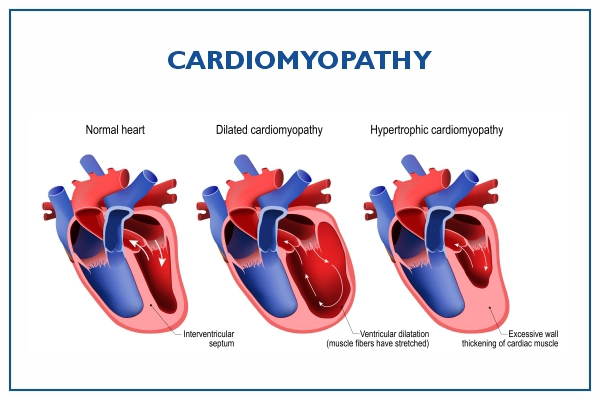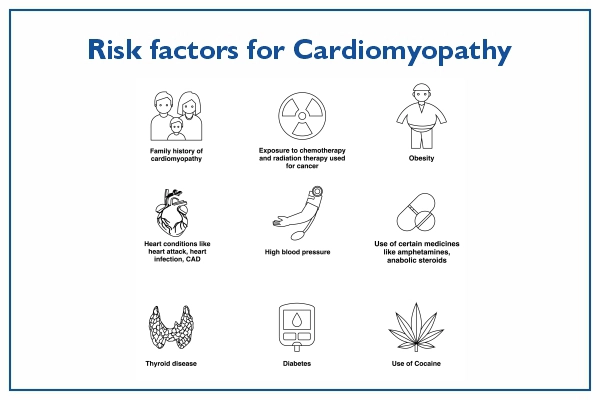Cardiomyopathy
Cardiomyopathy is a condition that affects the heart muscle and makes it more difficult for the heart to pump blood to other organs of the body. Heart failure and other
cardiovascular conditions
can be caused by cardiomyopathy.
Dilated, hypertrophic, and restrictive cardiomyopathies are the three primary types of cardiomyopathy. The kind of cardiomyopathy and the severity of it determine the type and course of treatment, which may involve drugs, surgically implanted devices, heart surgery, or, in extreme circumstances, a heart transplant.
Symptoms
Early development of cardiomyopathy may not exhibit any indication or symptom. However, when the illness worsens, several indications and symptoms are there such as:
- Difficulty falling asleep flat
-
Fatigue
- Fast, hammering, or fluttering
heartbeats
- Chest pressure or discomfort
- Unsteadiness, fainting, and
dizziness
If not treated, symptoms and signs frequently worsen. It depends on the individual whether the illness becomes worse swiftly or gradually.
When to see a doctor?
If you experience one or more of the cardiomyopathy-related signs or symptoms, consult your doctor. If you experience severe breathing difficulties, dizziness, or chest pain that lasts for more than a few minutes, immediately visit the hospital.
Some forms of cardiomyopathy can be inherited from parents (inherited). Your doctor might suggest that your family members get checked if you have the condition.
Get the best treatment for Cardiomyopathy from the top
Cardiology doctors
at Medicover Hospitals.
Causes
The exact causes for cardiomyopathy is frequently unknown. However, in other individuals, it is caused by a different ailment (acquired) or is inherited from a parent (inherited).
Acquired cardiomyopathy can result from specific medical conditions or activities like:
- Obstetrical complications
- An accumulation of iron in the heart's muscle (hemochromatosis)
- The development of granulomas, which are small clusters of inflammatory cells, in any organ in the body, including the heart and lungs (sarcoidosis)
- Aberrant protein accumulation in the tissues (amyloidosis)
- Connective tissue conditions
- Overindulging in alcohol for a long time
- Use of anabolic steroids, cocaine, or amphetamines
- Radiation and some chemotherapy medicines are used to treat cancer
- Persistently
high blood pressure
or
low blood pressure.
- Heart attack-related heart tissue damage
- Constant heart rate speed
- Cardiac valve issues
- The COVID-19 infection
- Several infections, including those that induce heart inflammation
- Metabolic conditions such diabetes, thyroid illness, or obesity
- Dietary deficiencies of vital nutrients, such as thiamin (vitamin B-1)
Risk factors
Numerous factors, such as the following, can raise your risk of cardiomyopathy:
- If cardiomyopathy, heart failure, and sudden cardiac arrest run in the family
- Persistently elevated blood pressure
- Heart-related ailments, such as a history of heart attacks, coronary artery disease, or a heart infection (ischemic cardiomyopathy)
- Being overweight causes the heart to work harder.
- Chronic alcohol abuse
- Usage of illegal drugs including cocaine, amphetamines, and anabolic steroid
- Radiation and certain chemotherapy medicines used in cancer treatment
Many illnesses, such as the following, increase your risk of cardiomyopathy:
-
Diabetes
-
Thyroid
condition
- Extra iron accumulated throughout the body (hemochromatosis)
- Amyloidosis
- Sarcoidosis
- Connective tissue conditions
Complications
Cardiomyopathy can lead to following complications if left untreated:
- Sudden death and cardiac arrest: Cardiomyopathy can produce abnormal heart rhythms that lead to dizziness or, in rare instances, abrupt death if the heart stops working properly.
-
Heart attack: The body requires more blood than the heart can physically pump. Heart failure can be fatal if left untreated.
- Clots of blood: Blood clots may form in the heart as a result of the heart's inability to pump efficiently. Clots can obstruct blood flow to other organs, such as the heart and brain, if they are introduced into the bloodstream.
- Cardiac valve issues: The heart's enlargement brought on by cardiomyopathy may prevent the heart valves from closing properly. Blood may start to flow backward in the valve as a result.
Prevention
Living a heart-healthy lifestyle can help lower your risk of cardiomyopathy and other types of heart disease, including:
- Avoiding using cocaine or alcohol
- Controlling diabetes, excessive cholesterol, and blood pressure
- Consuming a balanced diet
- Regularly exercising
- Getting sufficient rest
- Taking less stress
Diagnosis
Your doctor will probably conduct a physical checkup and inquire about your individual and antecedents' medical histories. Additionally, you'll be questioned about the timing of your symptoms, such as whether or not exercise makes them worse. Several tests may be carried out to confirm the diagnosis of cardiomyopathy, including:
-
Chest X-ray:
The size of the heart will be shown in a photograph.
-
Echocardiogram:
In this test, sound waves are used to produce images of the heart that display its size and beating patterns. This examination of the heart valves aids in identifying the origin of symptoms.
-
Electrocardiogram (ECG):
Electrode patches are applied to the skin during this non-invasive examination to assess electrical cardiac signals. The electrical activity of the heart can be disturbed by an ECG, which can reveal areas of damage and abnormal cardiac rhythms.
-
Stress test on a treadmill: While walking on a treadmill, blood pressure, respiration, and heart rate are observed. This test can assess symptoms, establish exercise capacity, and reveal whether strenuous activity causes irregular heartbeats.
-
Catheterization of the heart: A tiny tube (catheter) is placed into a blood artery in the groyne and guided to the heart. How forcefully blood pumps through the heart can be determined by measuring the pressure within the heart's chambers. Through the catheter, dye can be injected into blood arteries to make them more vibrant.
-
Biopsy:
A tiny tissue sample from the heart may also need to be removed for this test in order to be analysed in a lab.
- Heart
MRI:
Radio waves and magnetic fields are used in this procedure to produce images of the heart. If the echocardiography pictures are insufficient for a diagnosis, a doctor may request a cardiac MRI.
-
Heart CT scan: This entails reclining on a table inside a machine to evaluate the size, function, and condition of the heart and its valves, an X-ray tube inside the machine spins around the body and gathers images of the chest and heart.
-
Blood test:
Blood tests may be performed for several purposes, such as determining iron levels and evaluating kidney, thyroid, and liver function.
-
B-type natriuretic peptide (BNP): A protein made by the heart, can be measured by a single blood test. When a person experiences heart failure, a typical cardiomyopathy consequence, their blood level of BNP may increase.
-
Genetic screening: Testing Cardiomyopathy can be inherited from parents to children (inherited). If you want to know if genetic testing is right for you, go to your doctor. Parents, siblings, and children are first-degree relatives who may be subjected to genetic testing or family screening.
Treatment
The goals of cardiomyopathy treatment are to:
- Manage signs and symptoms
- Prevent the condition from worsening
- Reduce the risk of complications
The type of treatment depends on the type of cardiomyopathy and its severity.
Medications
Many different types of medications are used to treat cardiomyopathy. Medications for cardiomyopathy can help:
- Improve the heart's ability to pump blood
- Improve blood flow
- Lower blood pressure
- Slow heart rate
- Remove extra fluid from the body
- Prevent blood clots
Interventional Treatments
To enhance the heart's performance and alleviate symptoms, a variety of devices can be surgically implanted there, including:
-
Implantable Cardioverter-defibrillator implant (ICD): This device tracks heartbeat rhythm and, when necessary, administers electric shocks that regulate erratic heartbeats. An ICD monitors and regulates irregular rhythms, a major consequence of cardiomyopathy, rather than treating the problem.
- (VAD) Device to aid the ventricles: By doing this, the heart's blood flow is aided. Usually, a VAD is only explored after less invasive options have failed. While awaiting a heart transplant, it can be used as a short-term or long-term treatment
-
Pacemaker: To manage arrhythmias, a tiny device is inserted under the skin in the chest or belly.
-
Septal myectomy: A portion of the septum, a thicker heart muscle wall that separates the two bottom heart chambers, is removed during this open-heart procedure (ventricles). The blood flow through the heart is improved, and mitral valve regurgitation is decreased, when a portion of the heart muscle is removed. Treatment for hypertrophic cardiomyopathy involves septal myectomy.
-
Cardiac transplant: For those with end-stage heart failure for whom medicines and other treatments are no longer effective, a heart transplant may be necessary.
Lifestyle changes and Selfcare
- Don't do smoking.
- If you are overweight, lose weight. What is a healthy weight for you? Find out from your doctor.
- Consume whole grains, a variety of fruits and vegetables, and other nutritious foods.
- Take less salt (sodium). Aim for a daily salt intake of no more than 1,500 milligrammes.
- Avoid alcohol, or other beverages that contain alcohol.
- Try to control your tension.
- Get adequate rest.
- As directed, take all of your medications.
- Schedule routine follow-up sessions with your doctor.
- Get frequent exercise after discussing the best type and amount of exercise for you with your healthcare physician.
Do’s and Don’ts
This condition requires proper treatment and a set of do’s and don’ts to be followed to manage cardiomyopathy and its related symptoms. During the treatment and even after the treatment, one needs to follow these:
|
Do’s
|
Don’ts
|
| Take enough sleep for at least 7 to 9 hours. |
Eat junk, oily or deep fried foods. |
| Eat healthy food and take proper balanced diet |
Forget to take medications. |
| Regular exercises or yoga. |
Let your cholesterol level increase. |
| Control your blood pressure levels |
Forget to go for routine checkups. |
| Take precautions to avoid any kind of infection. |
Do smoking or consume alcohol. |
| Manage your stress. |
Ignore other signs or symptoms. |
Follow the above tips and immediately inform the doctor if there are new pains or symptoms.
Cardiomyopathy Care at Medicover
At Medicover Hospitals, we have the most trusted team of doctors and medical experts who are experienced in providing excellent healthcare services to the patients with compassionate care. Our diagnostic department is equipped with modern technology and equipment to conduct the tests required for the diagnosis of Cardiomyopathy and other heart related conditions, based on which the most suitable and appropriate treatment plan is designed. We have an excellent team of Cardiologists and Cardiac Surgeons who diagnose and treat this condition with utmost precision that brings successful treatment outcomes.
Citations


